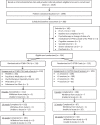A Randomized Clinical Trial of Clinician-Supported PTSD Coach in VA Primary Care Patients
- PMID: 36932268
- PMCID: PMC10022983
- DOI: 10.1007/s11606-023-08130-6
A Randomized Clinical Trial of Clinician-Supported PTSD Coach in VA Primary Care Patients
Abstract
Background: Posttraumatic stress disorder (PTSD) is common in primary care patients; however, evidence-based treatments are typically only available in specialty mental healthcare settings and often not accessed.
Objective: To test the effectiveness of a brief primary care-based treatment, Clinician-Supported PTSD Coach (CS PTSD Coach) was compared with Primary Care Mental Health Integration-Treatment as Usual (PCMHI-TAU) in (1) reducing PTSD severity, (2) engaging veterans in specialty mental health care, and (3) patient satisfaction with care.
Design: Multi-site randomized pragmatic clinical trial.
Participants: A total of 234 veterans with PTSD symptoms who were not currently accessing PTSD treatment.
Intervention: CS PTSD Coach was designed to be implemented in Veterans Affairs PCMHI and combines mental health clinician support with the "PTSD Coach" mobile app. Four 30-min sessions encourage daily use of symptom management strategies.
Main measures: PTSD severity was measured by clinician-rated interviews pre- and post-treatment (8 weeks). Self-report measures assessed PTSD, depression, and quality of life at pretreatment, posttreatment, and 16- and 24-week follow-ups, and patient satisfaction at post-treatment. Mental healthcare utilization was extracted from medical records.
Key results: Clinician-rated PTSD severity did not differ by condition at post-treatment. CS PTSD Coach participants improved more on patient-reported PTSD severity at post-treatment than TAU participants (D = .28, p = .021). Coach participants who continued to have problematic PTSD symptoms at post-treatment were not more likely to engage in 2 sessions of specialty mental health treatment than TAU participants. Coach participants engaged in 74% more sessions in the intervention and reported higher treatment satisfaction than TAU participants (p < .001).
Conclusions: A structured 4-session intervention designed to align with patient preferences for care resulted in more patient-reported PTSD symptom relief, greater utilization of mental health treatment, and overall treatment satisfaction than TAU, but not more clinician-rated PTSD symptom relief or engagement in specialty mental health.
Keywords: PTSD; Veterans; mHealth; mental health; primary care.
© 2023. This is a U.S. Government work and not under copyright protection in the US; foreign copyright protection may apply.
Conflict of interest statement
The authors declare that they do not have a conflict of interest.
Figures
References
-
- Wray LO, Szymanski BR, Kearney LK, McCarthy JF. Implementation of primary care-mental health integration services in the Veterans Health Administration: program activity and associations with engagement in specialty mental health services. J Clin Psychol Med Settings. 2012;19(1):105–116. doi: 10.1007/s10880-011-9285-9. - DOI - PubMed
-
- Cook JM, Zeber JE, Simiola V, Rossom R, Scherrer JF, Owen-Smith AA, et al. Comparisons Between Patients Diagnosed with PTSD in Primary Care Versus Mental Health Care in Five Large Civilian Health Care Systems. J Clin Psychol Med Settings. 2021;28(2):221–228. doi: 10.1007/s10880-020-09706-8. - DOI - PMC - PubMed


